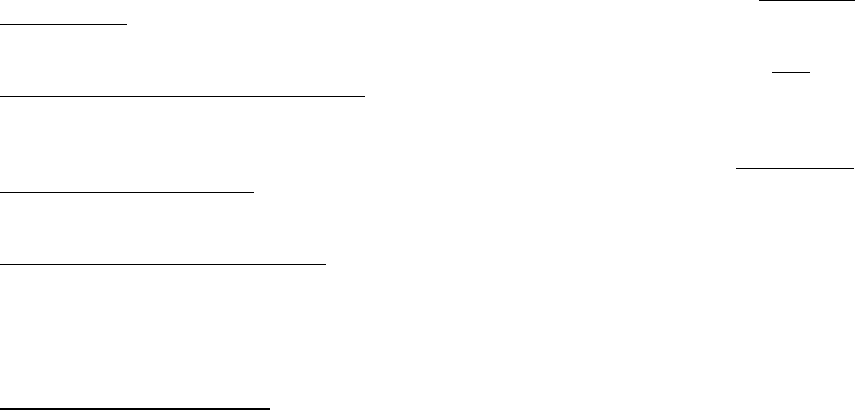D. Gerald Searfoss, DBA, CPA
13704 E. Bellessa Lane
Spokane, WA 99206
January 5, 2009
Ms. Lisa Axisa
National Association of State Boards Of Accountancy
Dear Ms. Axisa,
I apologize for not responding prior to the December 31, 2008 comment period expiration
date regarding the Draft document concerning 120 hour versus the 150 hour requirement
to sit for the CPA examination. Frankly, a one month exposure period was a bit short.
I am a retired partner from Deloitte & Touche, having served as the National Director of
Accounting Standards for the firm, and I am a Professor Emeritus of Accounting from the
University of Utah. Over the years I have served on the NASBA Education Committee
and served on and chaired numerous AICPA committees, subcommittees and task forces,
including serving on and chairing the Financial Accounting and Reporting Subcommittee,
which reviews and approves all CPA examination questions regarding financial
accounting, and serving on the CPA Examination Content Committee. Most recently, I
was a member of the AICPA Practice Analysis Oversight Group that spearheaded the
study of the current skills and knowledge practitioners and others believe are necessary to
serve the public interest. Please see my attached bio.
I am very disappointed in the conclusions of the draft report. The conclusions imply that
receiving the CPA certificate, independent of the license to practice, will be readily
achievable with only 120 semester hours of higher education. I think that is fallacious
thinking and misleading to the public and to future potential CPA examination candidates.
My experience with the preparation of the examination and the practice analysis both
support the conclusion that the amount and complexity of knowledge and the requisite
skills to practice and serve the public interest is growing rapidly, not declining. The CPA
examination is a mechanism to judge competency to practice, thus the content of the
examination should reflect that growth in knowledge and complexity and the diverse set
of skills to serve the public interest. If the results of the practice analysis are incorporated,
as they should be, in developing the future content and approach of the examination, the
increase in expected knowledge and topical complexity will be reflected accordingly in
the exam. If the examination does not accomplish that, than shame on us!
Given the increasing volume of knowledge and skills, it has also become increasingly
difficult for faculty to include coverage of all of the knowledge and skills in 150 hours,
let alone 120 hours. Thus, to send the message that 120 hours of higher education is
adequate to demonstrate the ability to serve the public interest will do harm to the
profession by demeaning the CPA examination.

As you know, the publ
ic accounting profession is under the highest level of scrutiny in its
history. There is a level of expectation that is extremely high, and rightfully so. We have
told the public that we hold ourselves to the highest level of professionalism and integrity,
and we tout the CPA examination as a tool to demonstrate a high level of competence
upon passing the exam. Given both NASBA’s and the AICPA’s significant roles in the
preparation and administration of the CPA examination, it appears that the conclusions in
this report will be viewed as a leading group in the profession speaking out of both sides
of its mouth, sending contradictory messages. It will be implied that the examination is
not the tool that we claim it is.
The reliance simply on historical examination pass rates is insufficient to reach the
conclusions reflected in the draft report. I strongly encourage NASBA to consider this
issue as one of whether the examination is accomplishing its appropriate objective in
testing, in a rigorous manner, the knowledge and skills necessary to serve the public
interest. Concluding that the pass rates indicate that someone should be certified with the
limited exposure that one can achieve in only a 120 hour undergraduate degree versus
150 hours of higher education is inappropriate. It undersells this profession and seems to
establish low expectations of those who desire to be certified. Accounting education
should prepare students and future CPAs to practice in the public interest, possessing the
necessary level of knowledge and skills, and the exam should be designed to test those
accordingly.
I continue to believe that 150 hours of higher education should be necessary to qualify for
taking the exam and to practice after appropriate experience.
If you have any questions please do not hesitate to contact meat 509-290-6302, or
dgsearfoss@comcast.net.
Sincerely,
D. Gerald Searfoss
D. GERALD SEARFOSS, DBA, CPA
Address:
13704 E. Bellessa Lane
Spokane, WA 99206
Telephone: Home 509-290-6302
Cell 801-550-9788
Fax 509-290-6392
Email: dgsearfoss@comcast.net
Degrees and Certification
• Doctor of Business Administration
Indiana University, 1972
• Masters of Business Administration
Indiana University, 1971
• Bachelor of Science - Economics
Albright College, 1969
• Certified Public Accountant – Utah
Positions Held
• 2007-Present Emeritus Professor of Accounting (retired)
• 1994-2007 Professor of Accounting (tenured), University of Utah
• 1983-1994 Partner, Deloitte & Touche (retired) (See details of my
responsibilities on the following pages)
• 1982-83 Visiting Professor, Deloitte & Touche
• 1980-82 Professor of Accounting (tenured), University of Utah
• 1976-80 Associate Professor (tenured), University of Utah
• 1972-76 Assistant Professor, Arizona State University
Board Membership
• UBS Bank USA, Director; Chair, Audit Committee, 2003-present (UBS Bank USA,
is an FDIC insured entity, and a wholly owned subsidiary of UBS AG in Zurich).
RESPONSIBILITIES AT DELOITTE & TOUCHE
National Office Director of Accounting Standards - 1983-1991
I was responsible for the development of Deloitte & Touche positions and comment
letters regarding proposed FASB and AICPA guidance on accounting issues, an
presentation of the firm’s views at related public hearings of the FASB. In addition, I had
the responsibility for providing training and consultation to partners, staff and clients on
accounting for pensions, postretirement benefits, current values, and employee stock
ownership plans. I also had responsibility for the development of publications that
provided internal guidance on auditing and accounting issues. Examples of clients that I
consulted with on accounting issues include Boeing, Chrysler, General Motors, Loews,
Prudential, RJR-Nabisco, Rockwell, and UPS.
National Director of Academic Development - 1991 - 1994
Responsible for the relationships with academia and the development and implementation
of firm efforts to impact accounting and business education.
Secretary and Treasurer of the Deloitte & Touche Foundation - 1991 - 1994
Responsible for the administration of the Foundation including budgets, program
development and implementation and the matching gift program. The Foundation is
focused on assisting and enhancing accounting and business education.
POSITIONS / MEMBERSHIPS IN PROFESSIONAL ORGANIZATIONS
American Accounting Association
• Member, Practice Advisory Committee, 1998-2000
• Member , Changing Environment Committee, 1997-98
• Member, Editorial Board, Accounting Horizons, 1994-97
• Member, Editorial Board, Issues in Accounting Education, 1995-98
• Vice President, Financial Accounting and Reporting Section, 1993-94
• Member, 1992-93 Administrative Support Committee of the Administrators of
Accounting Programs Group
• Member, AAA Financial Accounting Standards Committee, 1990-93
• Member, AAA Financial Reporting Issues Conference Committee, 1990-92
• Vice President of the Association, 1988-90
• Member, AAA Standing Committee on Publications, 1986-89
• Member, AAA Committee on Relations Between Academics and Practitioners, 1988
POSITIONS / MEMBERSHIPS IN PROFESSIONAL ORGANIZATIONS
(Continued)
• Member, Ad Hoc AAA Publications Committee, 1984-86
American Institute of Certified Public Accountants
• Member, CPA Examinations Practice Analysis Oversight Group, 2006-present
• Member, CPA Examination Content Committee, 2005 - 2007
• Chair and Member, Financial Accounting and Reporting Subcommittee, 2003- 2007
• Member, Financial Accounting and Reporting Simulations Task Force, 2003-2006
• Member, Computerized CPA Exam Educator Task Force, 2002-2004
American Institute of Certified Public Accountants (Continued)
• Chair, Accounting Education Executive Committee, 1997-99
• Member, Strategic Planning Advisory Subcommittee, 1997-99
• Member, AAA/AICPA Accounting Literature Awards Committee, 1995-97
• Chair, AcSEC Task Force on Accounting Practices for Certain Employee Stock
Ownership Plans - Revision of SOP 76-3
• Member, Curriculum and Instruction Subcommittee of the Academic and Career
Development Executive Committee, 1991-93
• Member, Accounting Standards Executive Committee (AcSEC), 1986-1989
• Chaired, AcSEC Task Force on Amortization of Discounts on Certain Acquired
Loans
• Chaired, AcSEC Task Force to prepare comment letter and appear at public hearing
on the FASB Exposure Draft, "Employers' Accounting for Postretirement Benefits
Other Than Pensions"
• Member, AcSEC Task Force on Accounting for Quasi - Reorganizations
• Member, AcSEC Task Force on Discounting Applications
Financial Accounting Standards Board
• Member, Interest Methods Task Force
• Member, Working Group on Voluntary Disclosures in the Oil & Gas and Chemical
Industries
POSITIONS / MEMBERSHIPS IN PROFESSIONAL ORGANIZATIONS
(Continued)
National Association of State Boards of Accountancy
• Member, Education Committee, 2000 – present
Utah Association of CPAs
• Chair, Annual Educators Conference Committee, 2002-03
• Chair, Strategic Planning Committee, 1996-98
• Member, Strategic Planning Committee, 1995-96
• Technical Issues Committee, 1994-96
Accounting Education Change Commission
• Member, Grants Monitoring Task Force
Beta Alpha Psi
• Past Faculty Vice President - Arizona State University (1974-76) and University of
Utah (1977- 1981). I led the effort and organized the students to create an Accounting
Club that was a prerequisite to establishment of the Utah chapter.
• Past Member, National Advisory Forum
Federation of Schools of Accountancy
• Member, Federation of Schools Of Accountancy, Curriculum Content Committee,
2000 - 2001
• Member, Committee on Transitioning For Change, 1991-93, 1996
• Member, National Association of State Boards of Accountancy, Education
Committee, 2000 – 2001
American Assembly of Collegiate Schools of Business
• Member, Accounting Accreditation Committee, 1991-93

AWARDS
• 2007 Utah Association of CPAs Outstanding Accounting Educator Award
• 2003 University of Utah, David Eccles School of Business, Masters Programs
Teaching Excellence Award
• 2002 University of Utah, David Eccles School of Business, Distinguished Faculty
Professional and Community Service Award
• 1995 University of Utah, Beta Alpha Psi Outstanding Teaching Award
• 1989 Indiana University, Beta Alpha Psi Outstanding Alumnus Award Recipient
• 1987 University of Utah, Beta Alpha Psi Outstanding Accountant Award
• 1982 National Outstanding Beta Alpha Psi Faculty Advisor
• 1977-78 University of Utah, Business Student Government Faculty Service Award
• 1971 Indiana University, Doctoral Student Teaching Excellence Award
PUBLICATIONS
An Investigation of the Attributes of Top Industry Audit Specialists, Behavioral Research
in Accounting, 2004, Volume 16, (With Mohammad J. Abdolmohammadi and James
Shanteau)
Employers' Accounting for Employee Stock Ownership Plans, Journal of Accountancy,
February 1993, (With Dionne D. McNamee)
"Current Value Reporting for Real Estate", Journal of Accountancy, October 1990.
(With Judith Fellner Weiss)
"The Handbook of Accounting And Auditing, Second Edition". Warren, Gorham &
Lamont, 1989. (With Robert S. Kay)
"The Big Unfunded Liability: Postretirement Healthcare Benefits", Journal of
Accountancy, November 1988. (With Naomi Erickson)
"Developing Human Resource Accounting as a Human Resource Decision Support
System", Accounting Horizons, September 1988, Vol. 2, No. 3, (With Eric G. Flamholtz
and Russell Coff)
"Intermediate Accounting", Second Edition (With Paul B.W. Miller and Kenneth Smith).
Published by Richard D. Irwin, Inc., 1984
"A Feasibility Study of a Model for Audit Planning and Evidence Evaluation", Journal of
Accounting Research, Annual Supplement, 1979 (With Barry E. Cushing, and Reed
Randall)

PUBLICATIONS
- continued
"Uncovering Corporate Irregularities: Are We Closing the Expectation Gap?", Journal of
Accountancy, October 1977. (With David Baron, Douglas Johnson, and Charles Smith)
"Corporate Irregularities: Bankers' Expectations and the New Audit Standards", The
Journal of Commercial Bank Lending, (Vol. 59, No. 11, July 1977). (With David Baron,
Douglas Johnson, and Charles Smith)
"Some Behavioral Aspects of Budgeting for Control: An Empirical Study", Accounting,
Organizations and Society (Vol. 1, No. 4, 1976)
"Perceived Participation in the Budget Process and Motivation to Achieve the Budget",
Academy of Management Journal, December, 1973 (With Robert M. Monczka)
SELECTED PRESENTATIONS
ACADEMIC MEETINGS
"Research Opportunities in Financial Reporting", 1992 and 1993, AAA Doctoral
Consortium.
"Academic and Practitioner Reactions Regarding the Relevance of Accounting Research",
American Accounting Association Financial Reporting Research Conference. 1991,
Harvard University.
"A Critical Examination of the Accounting Education Process", The Future Direction of
Accounting Conference. 1989, The University of Alabama.
"Accounting Standard Setting: Follies, Fables and Reality", 1986 Accounting Executive
in Residence Program, School of Accounting, San Diego State University.
"Human Resource Decision Analysis", Future Directions of Human Resource
Management: An Invitational Conference, Graduate School of Management, University
of California, Los Angeles, 1985.
"Accounting Research: A Need for Emphasis on Relevance", 1984 Annual Accounting
Research Consortium, School of Accountancy, University of Alabama.
"Accounting Research: Theoretical and Applied". 1983 Accounting Research
Convocation, University of Alabama.
"A Feasibility Study of a Model for Audit Planning and Evidence Evaluation", (With
Barry E. Cushing and Reed Randall), 1979 University of Chicago Annual Conference on
Accounting Research.
"The Effective Utilization of an Accounting Student Organization in the Accounting
Education Process", Thirteenth Annual Western Regional Meeting of the American
Accounting Association.

SELECTED PRESENTATIONS
- Continued
"Fraud and Adverse Management Behavior: Three Perspectives on the Detection and
Reporting Responsibilities of the Independent Auditor", (With Doug Johnson), Eleventh
Annual Western Regional Meeting of the American Accounting Association.
PROFESSIONAL MEETINGS
"The Financial Reporting Impact of Postretirement Benefits", National Association of
Corporate Directors, Boston Chapter, 1992.
"Financial Reporting Issues Related to Post retirement Benefits", RJR/Nabisco Financial
Reporting Group, 1990.
"The Accounting Standard Setting Environment", Financial Executives Institute, Rocky
Mountain Chapter, Denver, 1990.
"Current Issues in Financial Reporting", 70th Annual National Association of
Accountants Conference. 1989, Cincinnati.
PROFESSIONAL MEETINGS - Continued
"Pension Accounting: Impact on the Bottom Line", 1988, Financial Executives Institute,
Boston Chapter.
"Professional Update", 1988 Utah Association of CPAs Annual Convention.
"Current Financial Reporting Developments", 1986 Annual Technical Update, Financial
Executives Institute, Atlanta Chapter.
"Human Resources Accounting: A Tool for Decision Making", 1985 Annual Conference
on Public Personnel Administration.
"Current Accounting Issues", 1984 Annual Meeting, North Carolina Association of CPAs.
"The Organizational and Motivational Issues in Managing a Corporate Accounting
Function", 1983 Annual Meeting, American Women's Society of CPAs.
"Methods for Estimating Current Costs", Financial Accounting Standards Board
Conference on Statement 33, 1982.
EDITORIAL POSITIONS
• U.S. Correspondent, World Accounting Report, London
• Past member, Editorial Board, Accounting Horizons. A journal of the American
Accounting Association.
• Past Member, Editorial Board, Issues in Accounting Education. A journal of the
American Accounting Association.
• Past Member, Editorial Board, Issues in Accounting Regulation. Case Western
Reserve University.
•
Ad Hoc Reviewer, Advances in Accounting. An independent journal.
• Past Member, Editorial Board, Auditing: A Journal of Practice and Theory. The
journal of the Auditing Section of the American Accounting Association.
